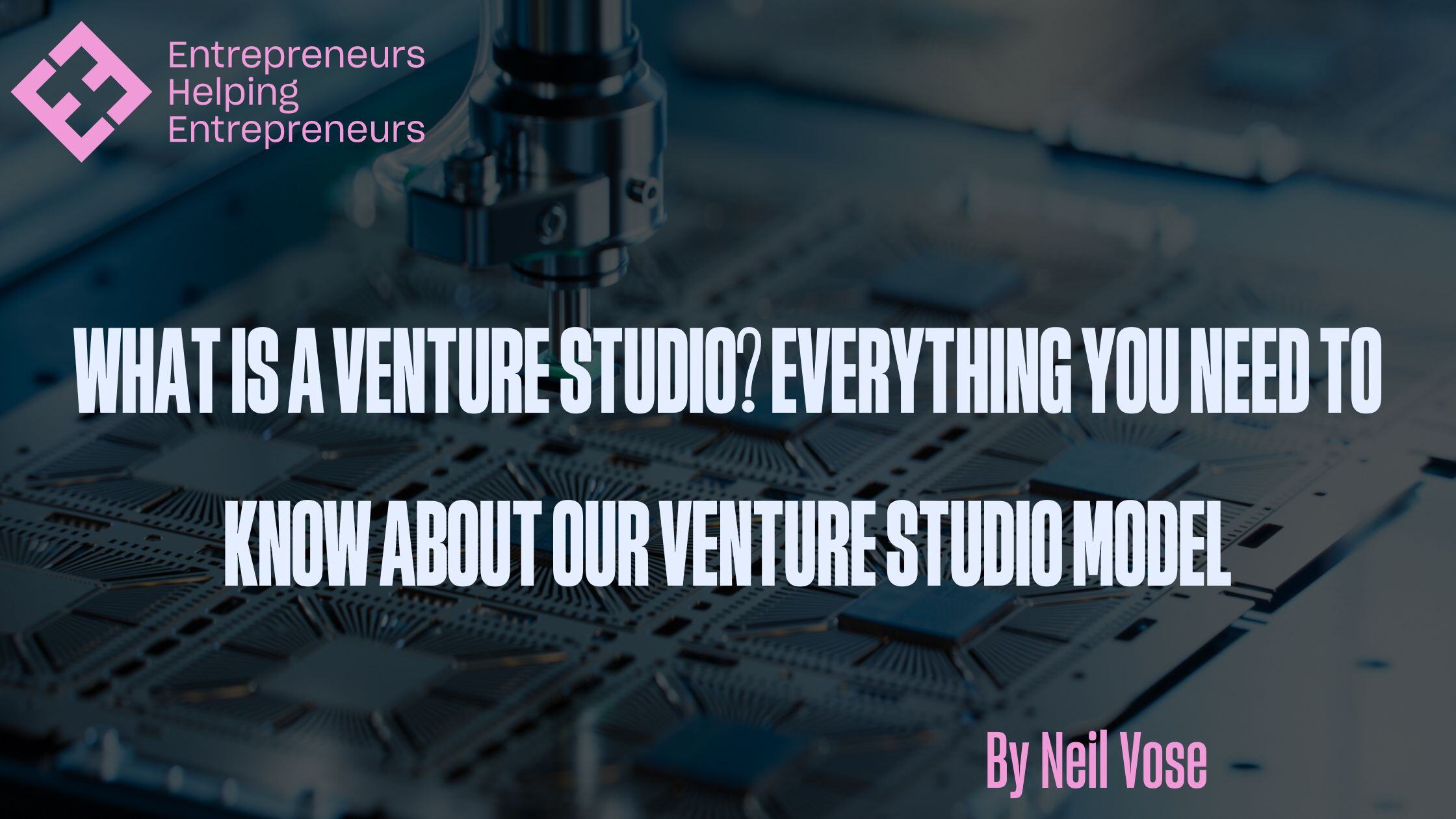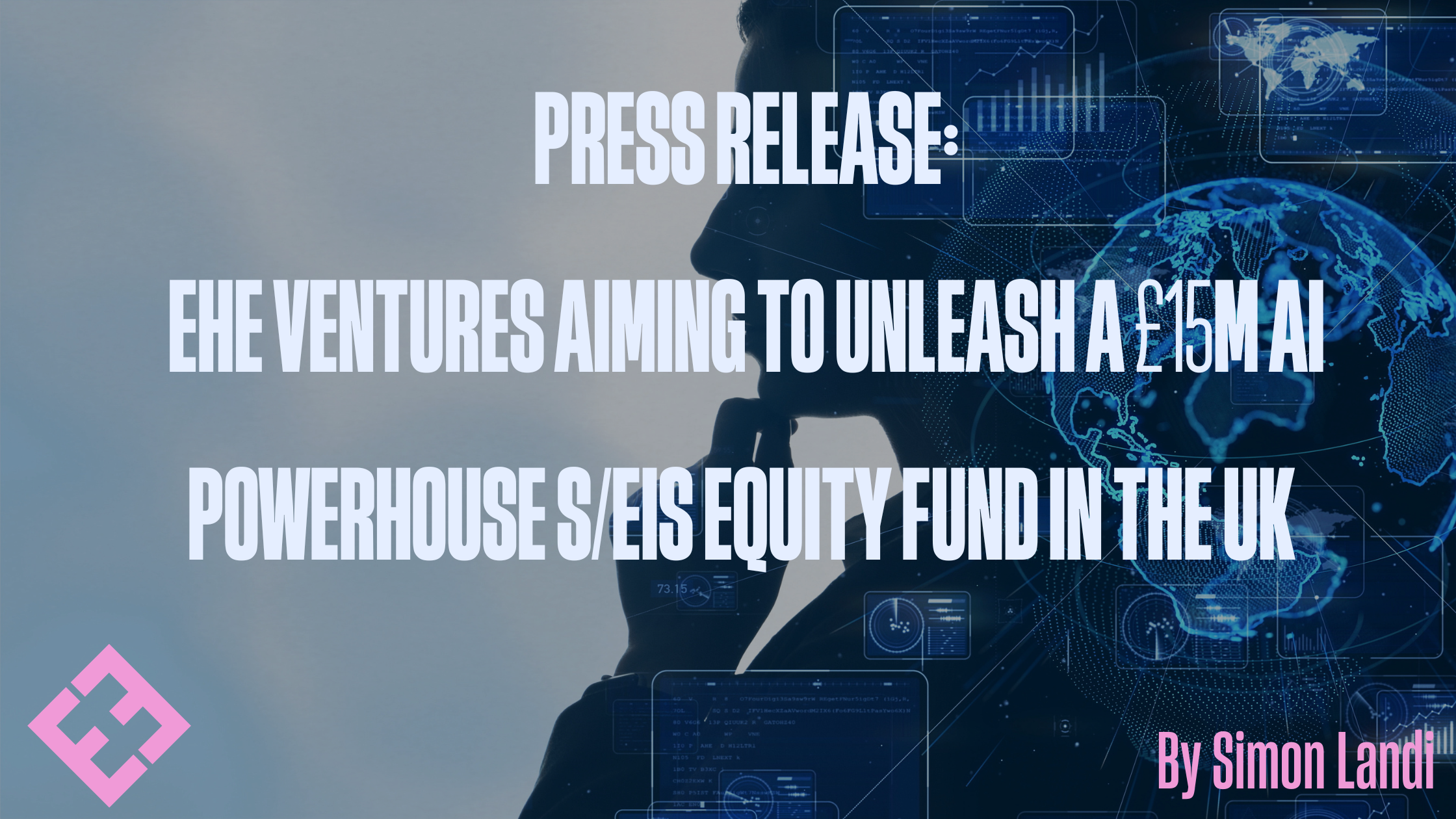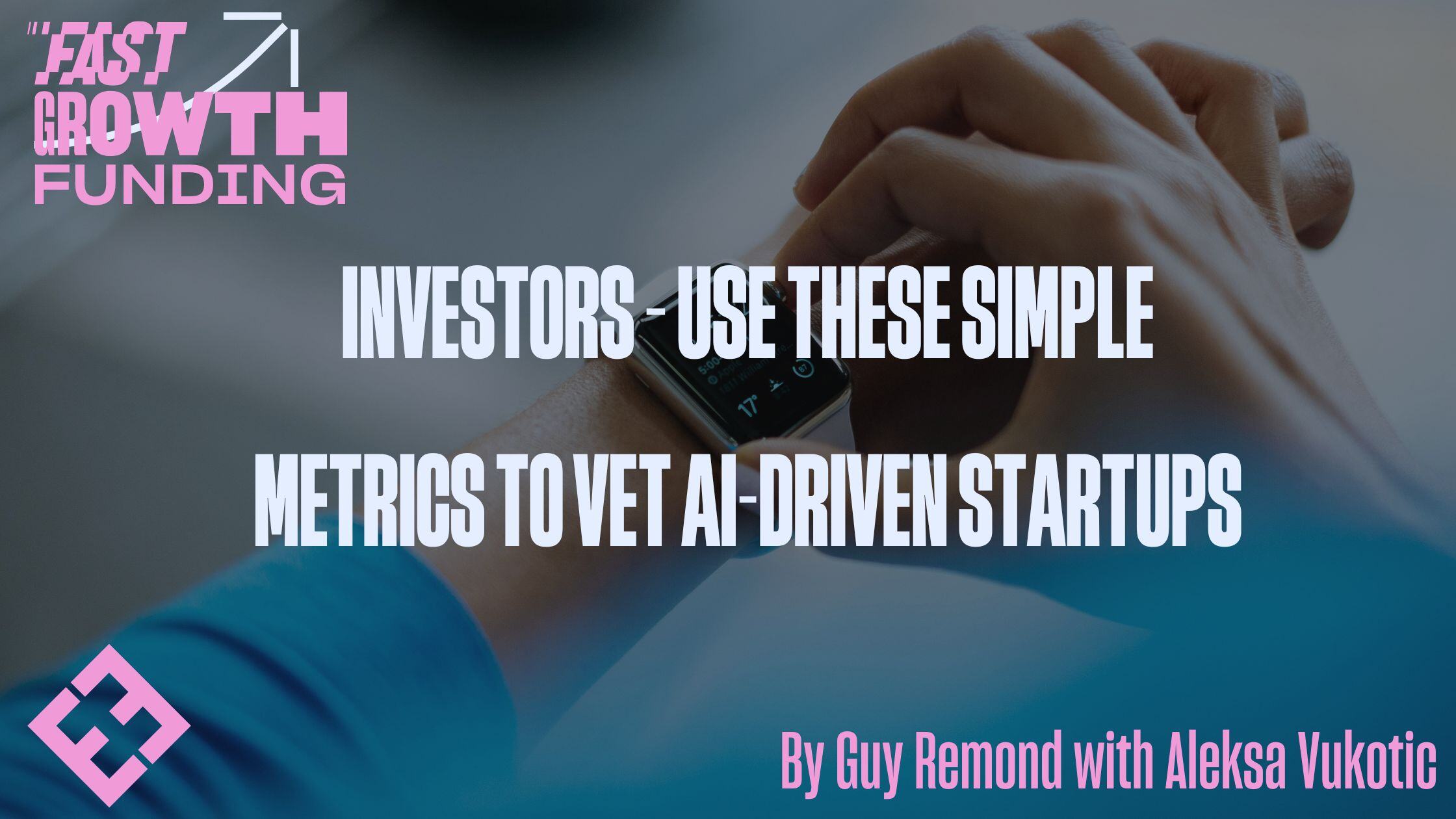Press Release: EHE Ventures aiming to unleash a £15m AI powerhouse S/EIS equity fund in the UK
By Simon Landi
9 min read
Sogi Chukwuanu : Jul 24, 2024 11:52:57 AM

By Neil Vose
An interesting funding model has been making the waves for several years now.
Venture studios.
Over the past few decades, this model has had incredible results. To begin with, venture studio startups have a 30% higher success rate than traditional startups. Startups created in venture studios also achieve seed funding twice as fast and exit 33% faster than conventional startups.
But what exactly is the venture studio model? And why should it matter to founders and investors?
A venture studio is a unique combination of company-building and venture funding. Unlike traditional VC firms that provide capital to existing startups, venture studios actively create and develop new companies from the ground up. They offer initial funding, a strategic roadmap, and hands-on operational support.
Additionally, they can collaborate with scale-ups and corporates by leveraging their expertise and resources to drive innovation, streamline operations, and explore new market opportunities, ultimately fostering growth and long-term success.
For founders, working with a venture studio means having a partner that offers more than just money – they get expertise, resources, and a structured approach to growth. For investors, it means accessing well-vetted, high-potential startups with reduced risk and increased chances of success.
They benefit from the rigorous vetting and development processes that studios employ, ensuring that the startups they back are not only innovative but also structurally sound and market-ready.
This dual approach of funding and building significantly de-risks investments and opens up opportunities to be part of high-growth ventures from their inception.
N.B. Find out more about our S/EIS AI-focused fund here.
The venture-studio idea dates to 1996, when Bill Gross launched Idealab to systematically test ideas, back the winners with shared resources, and spin them into standalone companies. Over time, Idealab reported creating 150+ companies with 45+ IPOs and acquisitions – proof that a repeatable company-building process could work in practice.
After the dot-com reset, the model spread. Rocket Internet (founded 2007) industrialised venture building in Europe, pairing centralised services with aggressive execution and helping shape successes like Zalando and Delivery Hero. At the same time, specialised and corporate studios arrived: BCG Digital Ventures (2014) formalised the corporate build model, while Founders Factory (2015) combined a studio with sector accelerators and brand partners.
Independent studios scaled too. High Alpha (2015) focused on B2B SaaS and has launched 40+ companies. eFounders – now Hexa – began in 2011 and reports a portfolio with multi-billion-dollar aggregate value, reinforcing that a tight thesis plus shared playbooks can produce repeatable outcomes.
By the 2020s, studios globalised and specialised (AI, fintech, climate, deep tech) and the studio + fund hybrid became common. The emphasis shifted toward capital efficiency, cleaner governance, and clearer spin-out criteria, with studios treating venture creation as a discipline rather than a one-off bet.
These three models all support startups, but they’re built for different moments.
Venture studios often start at the very beginning. They co-create new companies from scratch bringing a hands-on team, playbooks, and initial capital to move from a clear problem thesis to a first working product, first users, and early revenue. The aim is simple: build something real, fast, and get it seed-round ready.
Accelerators help teams that already exist. Startups join a fixed-length cohort, trade a small equity stake for intense mentorship and network access, and focus on turning early traction into repeatable growth across customers and markets. In other words: take what works and scale it.
Incubators are lighter-touch and longer-horizon. They provide space, community, and mentoring (often before any funding) so founders can explore ideas, build networks, and develop at a measured pace.
In short: venture studios often build from nothing to something; accelerators scale what’s working; incubators nurture exploration.
| Criterion | Venture studio | Venture capital (VC) | Accelerator | Incubator |
|---|---|---|---|---|
One-line definition |
Co-creates new companies from scratch with an in-house team and initial capital. |
Invests money into existing startups to fund growth. |
Time-boxed programme that mentors existing startups for a small equity stake. |
Longer-horizon environment offering space, community, and light mentoring. |
Starting point |
Often idea stage or very early-stage. |
Formed company raising a round. |
Formed team with MVP/early traction. |
Idea or pre-team; exploration. |
Goal at this stage |
Build first product, win first users/revenue, then spin out as a seed-ready company. |
Hit growth milestones and raise subsequent rounds. |
Turn early traction into repeatable growth and a seed/next round. |
Explore ideas, form team, prototype. |
Equity taken (typical)* |
~20–40% at formation, usually steps down over time. |
Deal-dependent; often ~10–25% at seed. |
~5–10% for the programme. |
0–5% (many take none). |
Support intensity |
Very high: product, design, engineering, growth, talent. |
Low–medium: board help, network, some ops support. |
Medium–high: mentors, workshops, network. |
Low: workspace, community, office hours. |
Best for |
Founders/operators/domain experts who want speed and a build partner. |
Startups seeking capital and networks to scale. |
Early teams wanting structure, signal, and pace. |
Early exploration before fundraising. |
Studios earn primarily through equity in the companies they co-found. They may also take modest cash fees for services (product, design, growth, talent, legal) during intensive build phases. Some operate a fund alongside the studio that invests pre-seed/seed and captures upside via standard venture returns. Corporate studios can add strategic value capture, such as options for commercial partnerships, first-look rights, or revenue-share on pilots.
Equity is negotiated case-by-case, but studios typically aim for a material minority at formation that reflects their contribution of team, playbooks, initial capital, and shared IP. The stake usually steps down over time through founder refreshers, employee options, and later rounds. Expect variation by model: capital-heavy or corporate studios may take more up front; lightweight, founder-led builds may take less. Investors will look for clarity on vesting, founder ownership at seed/Series A, and long-term incentive alignment.
Choosing a studio is a strategic call. Here’s a clear view of what you gain:
Picking the right studio is as much about the platform as the pipeline. Here’s how to think about it.
Studios create multiple shots on goal under one operating system: shared governance, reporting, and talent. That concentration cuts noise but introduces platform risk: your exposure rides on the studio’s people, process, and capital discipline. Diligence should prioritise the team and model (how they source ideas, kill weak ones, and support winners) as much as the venture list itself.
When a studio consistently compresses the journey from idea to first product and revenue, you tend to see quicker mark-ups and cleaner paths to follow-on capital. Outcomes still hinge on market timing, founder quality, and the studio’s reserve strategy. Look for pace without spray-and-pray: measured deployment, milestone-driven follow-ons, and clear spin-out criteria.
The EHE Group consists of EHE Ventures Limited and The Startup Factory.
Together, EHE Group is a venture studio that offers three distinct but interdependent products to enable the growth of UK start-ups/scale-ups (many of those being AI first and AI-enabled).
Having built and invested in multiple tech startups ourselves, we understand that building and scaling a successful tech startup requires more than just a great idea. That’s why our venture studio model is designed to provide comprehensive support across these critical areas: Tech, Funding, and Advisory.
Our mission is to empower AI-driven startups and tech entrepreneurs to achieve rapid growth and make a lasting impact. Here’s how we do it:
Our venture studio boasts an in-house engineering team through The Startup Factory (TSF). This team comprises tech experts specialising in building scalable software applications. For years, the TSF team has leveraged their technical know-how and business expertise to help startups and investors realise their potential.
Here’s how:
EHE Ventures provides the financial support necessary for startups to scale. We’re Entrepreneurs Helping Entrepreneurs – which is why our AI fund is being created to provide founders with the kind of hands-on support they need and help investors lead the future of innovation by backing the real winners:
Beyond initial investment, we also provide comprehensive support to ensure that our portfolio companies are well-prepared for growth and investment. This includes:
In a nutshell, we’re a team of tech experts, investors, and entrepreneurs with skin in the game who have chosen to combine our expertise to help both founders and investors achieve fast growth.
Our venture studio actively helps build and develop your company from the ground up. You get access to a team of experts who work with you on every aspect of your business. This means you’re not just getting money; you’re getting a partner who is as invested in your success as you are.
With our hands-on support, technical expertise, strategic funding, and expert advisory, you’re not just launching a startup; you’re building a high-potential, scalable business with a much higher chance of success.
As entrepreneurs ourselves, we align our interests with both founders and investors, sharing in the success of the companies we build.
Our venture studio focuses on creating and nurturing high-growth AI and tech startups, giving you access to a pipeline of well-vetted, innovative companies. We combine technical expertise with operational experience to invest in startups poised to become industry leaders.
This strategic approach, paired with our ongoing support for portfolio companies enhances their chances of success, leading to better returns for you.
Do venture studios work? The short answer: they can. Studies and ecosystem reports often show better early survival and faster fundraising for studio-born companies. That uplift is usually linked to hands-on company creation, shared services, and standardised governance. You’ll also see higher conversion to seed, quicker time to the first round, and stronger follow-on rates than solo founders. That said, treat comparisons with care. Samples are small, definitions differ, and methodologies vary.
A practical way to cut through the noise is to track a few simple metrics over time:
The takeaway is that a well-run studio with aligned incentives, clear governance, and a focused thesis can outperform. A poorly designed one won’t. If a studio can’t share these basics (plus pipeline health, talent density, and a disciplined “kill early” culture), consider that a red flag.
Our venture studio model offers the best mix of technical support, funding, and expert advice. This setup helps startups succeed and gives investors a better chance of backing winners.
If you’re an investor looking for high-growth opportunities in AI and tech or an investor mentoring a start-up founder, register your interest in our fund and let’s talk about how you can be part of the next big innovation.
WARNING: Don’t invest unless you’re prepared to lose all the money you invest. This
is a high-risk investment and you are unlikely to be protected if something goes wrong. Take 2 minutes to learn more.
Are venture studios the same as startup studios?
Yes, terms overlap. Both refer to organisations that co-create companies with founders.
How much equity does a studio take?
It varies by model, contribution, and sector. Expect a meaningful minority at formation, stepping down over time.
How do studios choose ideas?
Most run a thesis-led pipeline with customer discovery, small-scale tests, and milestone gates before committing resources.
Can I join with an existing idea?
Many studios partner with founders who bring problem/market expertise and want a build partner to accelerate execution.
Do studios work with scale-ups and corporates?
Yes. Some run innovation projects, pilots, or JV spinouts alongside net-new ventures.

By Simon Landi

By Guy Remond with Aleksa Vukotic